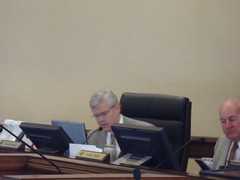A developer didn’t get his way at the Lowndes County Commission last month,
so now the county is proposing to change the zoning code for him!
To change zoning right next to Moody Air Force Base,
the largest employer in this area.
A change opposed by Moody because
of flight safety and safety of property,
and
“the longterm viability of Moody Air Force Base.”
A change that would set a precedent for further sprawl,
as Moody indicated indirectly when
the related rezoning first came before the Planning Commission.
Apparently a developer can get whatever he wants around here,
no matter how much it threatens the livelihoods or well-being
of the rest of the citizens.
Does that seem right to you?
To their credit,
the Planning Commission at its 26 November 2012 meeting
unanimously voted against this TEX-2012-02 just as they
did the rezoning case REZ-2012-17 last month.
Both will be decided by the Lowndes County Commission
at its 11 December 2012 meeting.
Lowndes County Board of Commissioners
A proposed text amendment to the Unified Land Development Code as it pertains to Single Family residential
Density and Minimum Lot Area within the MAZ (Moody Activity Zone)
County Planner Jason Davenport introduced this item.
 Ultimately at the end of the day this text amendment is a request
to change the minimum lot sizes allowed and the minimum residential densities
allowed in a MAZ-3 zoning district.
We have those changes highlighted on the screen but they have also been
highlighted in the packet….
At the end of the day that is what has happened.
Ultimately at the end of the day this text amendment is a request
to change the minimum lot sizes allowed and the minimum residential densities
allowed in a MAZ-3 zoning district.
We have those changes highlighted on the screen but they have also been
highlighted in the packet….
At the end of the day that is what has happened.
Well, yes, at the end of that day.
At the end of many future days this zoning code amendment
if approved will be used as a precedent for more sprawl
right next to Moody Air Force Base,
which is by far the biggest employer in this area.
The packet he referred to is not available to the public.
The changes he mentioned are not on his
Unified Land Development Code (ULDC) web page.
A view of them as seen from the back of the room is shown on the right here.
Can you read them?
 The
ULDC map linked on that page
includes the Moody Area insert map shown here on the right.
The
ULDC map linked on that page
includes the Moody Area insert map shown here on the right.
Davenport added that he had received one open records request and a response
from Moody.
Plus state law requires 30 days for Moody to respond and it had been 31 days.
Then he walked through some history using pages in Commissioners’ packets
that we the taxpayers, voters, and residents of Lowndes County can’t see.
Davenport
specifically tied this text amendment to a tabled zoning case:
Continue reading →

















